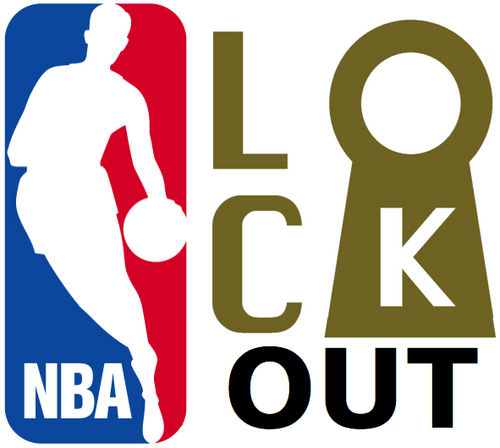The NBA, where a 30% pay cut was the better option
So the National Basketball Association, henceforth referred to as the 'NBA', 'The League', or 'The Association', fresh off by most accounts was a very successful season, one that started with the LeBron James 'Decision' drama last summer, followed by a compelling regular season that saw several young players raise their play to superstar status, and capped off by a dramatic Championship series were the aforementioned James' Miami Heat team was defeated by a rag-tag, inspirational band of tattooed milliionaires from Dallas, has managed to follow up on its recent success and buzz by failing to forge a new labor agreement between the owners and players, resulting in a classic 1930's style Lockout1.
The lockout has effectively stopped almost all league business, imposed a ban on teams having any contact with their players, and has even resulted in the scrubbing of the NBA's and associated team websites from player photos, bios, and really most signs that people actually play the games2.
Since in a lockout situation the owners no longer have to pay the players, one might think the teams could settle in for a protracted impasse, since player salaries make up the majority of team expenses. But even though the lockout is but a few days old, some teams are already making decisions that seem primarily intended to reduce non-player labor costs. Case in point - the Los Angeles Lakers decision to decline to renew the contract of long-time Assistant General Manager Ronnie Lester3.
From the ESPN Los Angeles piece on Lester's departure from the Lakers:
Barring a last-minute change of heart, Lester's 24-year run with the Lakers will end when his contract expires this month. By then, at least 20 other Lakers staffers, including almost all of the scouts who work under Lester in the basketball operations department, will have already packed their belongings and headed home. They've been told little by the team, except that employees whose contracts expire on or after June 30 would not have their contracts renewed, and their jobs may or may not open up again down the line.
So on the surface it seems like a sad, but kind of straightforward deal. The League is in what appears will be a lengthy labor dispute, the upcoming season is perhaps already in danger of being delayed, if not totally canceled, and teams like the Lakers are taking quick and aggressive steps to reign in labor costs that are still in their control. Makes sense right, and really isn't all that noteworthy a story.
That is until we catch one more little tidbit about the Lester employment situation with the Lakers, buried about 2/3 the way into the piece:
Lester wasn't fired or laid off. By all accounts, he's still greatly respected within the organization and around the league. Lakers general manager Mitch Kupchak considers him both a friend and one of the best assistant GMs in the league. He just didn't protect himself well enough last summer when the Lakers gave him the option of signing a one-year contract for the same pay as before, or a three-year deal at a 30 percent pay cut.
Now it gets more interesting. Apparently this time last year, the Lakers offered Lester a choice - re-up for one year at his current salary, or take a 30% hit but get the security of a three-year deal. Twelve months ago the lockout might have seemed a possible but unlikely outcome given the apparent irrationality of a collection of mostly billionaires (the owners) and millionaires (the players) being unable to agree on a fair division of a massive pot of revenues4. But even as far back as last summer even the most optimistic observers of the NBA scene were expecting a labor problem, and a likely lockout.
As an executive on the inside, Lester had to know that the lockout was likely, and he must have also suspected that in the event of a lockout, front office personnel might be in a tenuous situation. But knowing that, and presented with a three-year, 30% pay cut option, he elected to re-up for the single year, maintain his salary level, and leave himself exposed to the contract non-renewal it appears he is facing this month.
Tough call, even when not staring an impending business crisis in the face. But it is a good question to ponder, even if a theoretical one.
If your employer offered you a three-year guarantee with a 30% pay cut, would you take the deal?
Or would you roll the dice like Ronnie Lester did, maintain your salary for the time being, and take your chances?
Notes:
1. That sentence was over 100 words in length. Ridiculous. Get an editor.
2. It is really kind of jarring. Take a look at NBA.com if you don't believe me. The front page of the Knicks team site features a tribute to the team's dancers and the 'Knicks Now' section is mainly about some recent community outreach efforts by the club featuring team executives.
3. Lester's best season of his NBA playing career was 1981-1982, when he averaged 11 points per game for a pretty bad Chicago Bulls team. The second leading scorer on that team was Reggie Theus, possibly more well known to readers as the star of Saturday morning classic 'Hang Time'.
4. There is quite a difference in opinion how profitable (or not), the NBA is, and whether or not the players or owners are mainly responsible for the current labor crisis. Some good background can be found on the FiveThirtyEight blog at the New York Times site.

 Steve
Steve